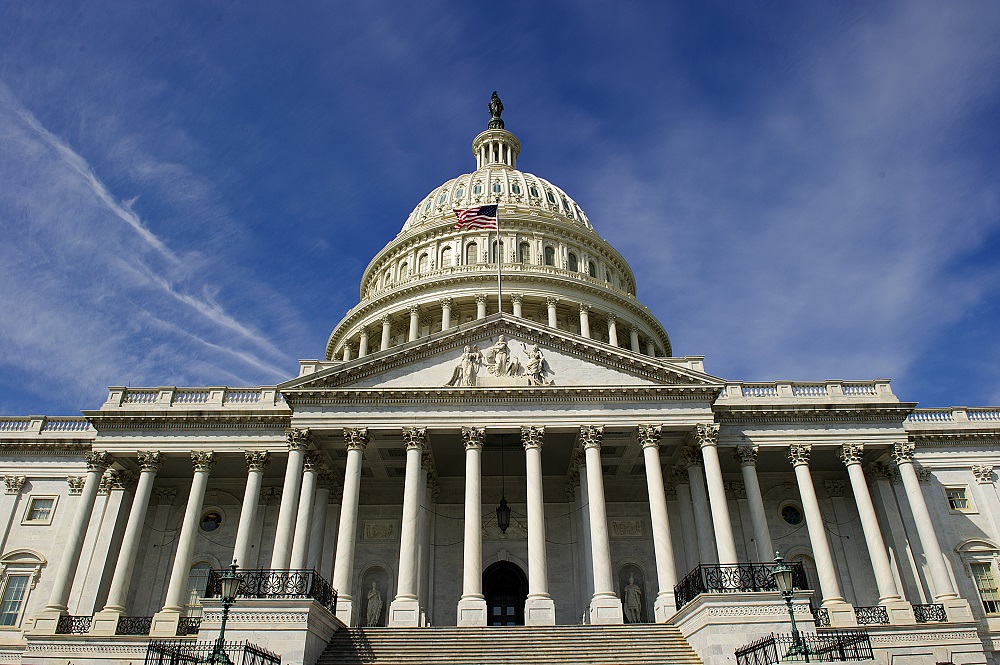Eager to curb the influence of Iran and its allies in the Middle East, Republicans and Democratic US lawmakers introduced on Thursday legislation to impose greater sanctions of Lebanese militant group “Hezbollah.”
Accusing the group of violence in Syria and amassing rockets along Israel’s border, the bill is an amendment to existing sanctions.
It seeks to further restrict its ability to fundraise and recruit, increase pressure on banks that do business with it and crack down on countries, including Iran, that support “Hezbollah”.
It would bar anyone found to be supporting the group from entering the United States, require the president to report to Congress on whether Iranian financial institutions are facilitating its transactions and impose blocking sanctions on the group for criminal activities.
“These sanctions will severely limit ‘Hezbollah’s’ financial network and transnational criminal activities, as well as crack down its backers, most importantly Iran,” Representative Ed Royce, the Republican chairman of the House Foreign Affairs Committee, said in a statement.
Versions of the bill were introduced in both the House of Representatives and Senate, sponsored by Royce and Eliot Engel, the ranking Democrat on the House Foreign Affairs Committee, and Senators Marco Rubio and Jeanne Shaheen, Republican and Democratic members of the Senate Foreign Relations Committee.
Officials in Lebanon have been worrying that US efforts to widen sanctions on “Hezbollah” could damage the country’s important banking industry. They visited Washington to lobby lawmakers in May.
But members of the US Congress and President Donald Trump’s administration want to weaken the power of Tehran and its allies. The Trump administration this week slapped new sanctions on Iran.
There was no immediate word on when or if the legislation might come up for votes in the House of Senate.
On Wednesday and it is annual “Country Reports on Terrorism”, the State Department said Iran was the planet’s “foremost” state sponsor of terrorism in 2016, a distinction the country has held for many years.
It said Iran was firm in its backing of anti-Israel groups as well as proxies that have destabilized already devastating conflicts in Iraq, Syria and Yemen. It also said Iran continued to recruit in Afghanistan and Pakistan for Shi’ite militia members to fight in Syria and Iraq. And, it said Iranian support for “Hezbollah” was unchanged.
Iran continues to be the world’s leading state sponsor of terrorism, the Trump administration added.
Iran has been designated a “state sponsor of terrorism” by the State Department and subjected to a variety of US sanctions since 1984, and many of the activities outlined in the report are identical to those detailed in previous reports. But, this year’s finding comes as the Trump administration moves to toughen its stance against Iran. The administration is expected to complete a full review of its policy on Iran next month.
Trump has been particularly critical of the Iran nuclear deal negotiated by the Obama administration and only reluctantly certified early this week that Iran remained entitled to some sanctions relief under its provisions.
“Iran remained the foremost state sponsor of terrorism in 2016 as groups supported by Iran maintained their capability to threaten US interests and allies,” said the report, the Trump administration’s first, which was released just a day after the administration slapped new sanctions on Iran for ballistic missile activity.
Some of those sanctions were imposed on people and companies affiliated with Iran’s Revolutionary Guard Corps, which the report said continues to play “a destabilizing role in military conflicts in Iraq, Syria and Yemen.”
Iran used a unit of the IRGC, the Quds Force, “to implement foreign policy goals, provide cover for intelligence operations and create instability in the Middle East,” the report said. It added that Iran has publicly acknowledged its involvement in Syria and Iraq.
“Hezbollah” worked closely with Iran to support the attempt by Bashar Assad’s Syrian regime to maintain and control territory, according to the report. And with Iranian support, “Hezbollah” continued to develop “long-term attack capabilities and infrastructure around the world,” it said.
The report also accused Iran of supplying weapons, money and training to militant Shi’ite groups in Bahrain, maintaining a “robust” cyber-terrorism program and refusing to identify or prosecute senior members of the al-Qaida network that it has detained.
